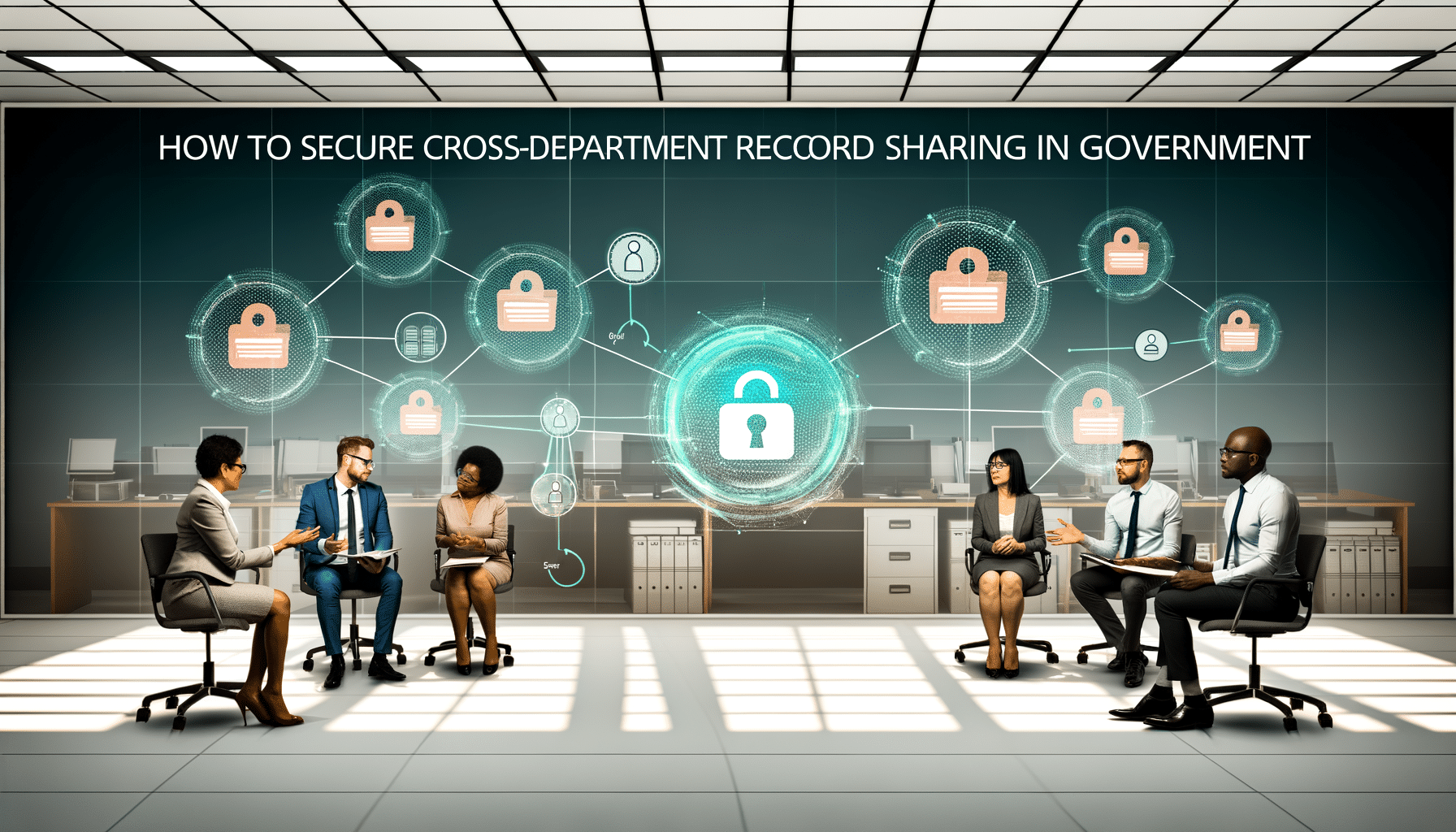- Security Best Practices
- June 7, 2024
How to Secure Cross-Department Record Sharing in Government

Understanding the Challenges of Cross-Department Record Sharing
Navigating the complex web of government departments is no easy feat, especially when it comes to sharing essential records seamlessly and securely. The traditional approaches to record management, often bogged down by bureaucratic processes, are proving inadequate in addressing these challenges in today’s digital world. So, how do we secure cross-department record sharing while maintaining efficiency?
The rise of AI and Blockchain technology offers transformative solutions that not only enhance security but also streamline the sharing process, ensuring compliance and efficiency. At RecordsKeeper.AI, I have seen firsthand how our innovative platform is shaping the future of government record management.
Embracing Technology for Record Sharing
Governments handle vast amounts of sensitive information that need to be shared across different departments—think healthcare records, financial transactions, and legislative documents. The stakes are high, given the potential risks associated with data breaches and non-compliance with regulations.
Here’s what makes adopting a technology-driven approach imperative:
- Enhanced Security: Implementing an AI and Blockchain-driven system enhances data security, ensuring only authorized personnel have access.
- Improved Efficiency: Automating the record categorization and retrieval processes saves time and reduces human errors, thus facilitating smoother cross-departmental exchanges.
- Compliance Assurance: Government departments must adhere to stringent regulations. Our platform helps automate compliance workflows, handling GDPR, HIPAA, and SOX standards with ease.
Why Security is Paramount
When it comes to cross-department record sharing, security should be the cornerstone of any implemented system. Modern secure data rooms, like those integrated within our platform, allow for controlled access and real-time activity tracking, making sure that your records are both accessible and protected.
- Access Controls: By establishing strict access controls, departments can ensure that only authorized individuals can view or edit records, effectively minimizing data exposure.
- Activity Monitoring: Real-time tracking of who accesses what can reveal patterns and potential threats, allowing for preemptive action in case of irregularities.
Automating Compliance and Policy Management
Compliance isn’t just a box to tick; it’s a vital component of sustainable government operations. A strategic approach to compliance involves not only adhering to current standards but also adapting to new regulations as they arise.
At RecordsKeeper.AI, our compliance management solution automatically updates workflows to meet evolving regulatory requirements, thereby reducing the administrative burden on department heads.
Moreover, automating policy management to enforce data retention and deletion ensures records are managed within the legal framework, bolstering the credibility and accountability of government operations.
The Role of Blockchain in Ensuring Data Integrity
Blockchain’s immutable nature is a game-changer in record integrity. Incorporating Blockchain technology into record management systems can:
- Ensure Tamper-Proof Records: Once information is added to the Blockchain, it cannot be altered or deleted without detection, providing a trustworthy record history.
- Facilitate Transparent Audits: Immutable records promote clear audit trails, making it easier for government agencies to conduct audits and maintain public trust.
Real-World Implementation: A Case Study
Let me share a vignette from our work with a local government body. The department faced constant struggles with inefficient record-sharing processes. By adopting RecordsKeeper.AI, they experienced enhanced collaboration and data security across departments. Automated processes reduced manual errors, enabling them to focus on their primary mandate—serving the public effectively.
Conclusion
Securing cross-department record sharing is not a future vision—it’s a current need. Leveraging advanced technologies like AI and Blockchain is pivotal in transforming how government departments manage and share records securely. By ensuring compliance, bolstering security, and increasing efficiency, records management turns from a daunting task into a strategic advantage.
For those wanting to discuss implementing cutting-edge record management solutions in your organization, or interested in my journey and insights as an entrepreneur in the tech space, feel free to reach out. Let’s reimagine what record management can be with RecordsKeeper.AI.
Toshendra Sharma is the visionary founder and CEO of RecordsKeeper.AI, spearheading the fusion of AI and blockchain to redefine enterprise record management. With a groundbreaking approach to solving complex business challenges, Toshendra combines deep expertise in blockchain and artificial intelligence with an acute understanding of enterprise compliance and security needs.
Related Posts

Why Law Firms Must Prioritize Data Encryption
Understand the critical role of data encryption in securing sensitive legal information.
- October 1, 2024

The Growing Role of Cybersecurity in Legal Record Keeping
Understand how cybersecurity measures protect sensitive legal records.
- September 2, 2024
Archives
- December 2024
- November 2024
- October 2024
- September 2024
- August 2024
- July 2024
- June 2024
- May 2024
- April 2024
- March 2024
- February 2024
- January 2024
- December 2023
- November 2023
- October 2023
- September 2023
- August 2023
- July 2023
- June 2023
- May 2023
- April 2023
- March 2023
- February 2023
- January 2023
- December 2022
- November 2022
- October 2022
- September 2022
- March 2019
Want to get more content like this?
Signup to directly get this type of content to your inbox!!
Latest Post
Organizing External Auditor Access
- December 22, 2024
Document Control in Manufacturing Plants
- December 21, 2024
Handling Rush Financial Report Requests
- December 20, 2024
Managing Record Access After Staff Changes
- December 19, 2024





